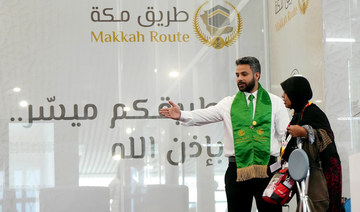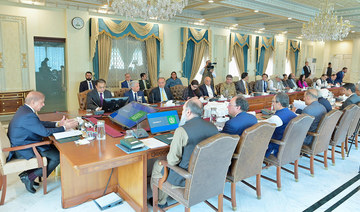ISLAMABAD: A British man, who set out to cover 30,000 kilometers across the world on a tandem after being diagnosed with late-stage cancer at 24, found himself mesmerized by the exquisite landscapes in northern Pakistan.
Luke Grenfell-Shaw was diagnosed with a rare and aggressive sarcoma in June 2018 which had metastasized into his lungs. Yet, he decided to fight back by performing physically strenuous activities such as running a marathon in his hometown of Bristol in the United Kingdom.
In 2020, Grenfell-Shaw launched Bristol-2-Beijing, his plan to bike across the world not only to raise money for organizations fighting cancer but also to create awareness about what people with cancer were capable of. With a goal of raising GBP 300,000, he set off to introduce the world to “CanLivers.”
“Rather than the word ‘cancer survivor,’ which I think gives this false sense of certainty, I coined the word ‘CanLiver,’ or someone who is living with cancer,” he told Arab News on Monday while making a stopover in Islamabad. “Such people acknowledge their situation and the challenges and uncertainties associated with it, though they also demonstrate how people can live with cancer and still manage to fulfil their dreams and do much more.”
Grenfell-Shaw decided not to let his diagnosis stop him from living the life the way he wanted.
“There’s so many things that we can’t control, but it’s really important that we think about what we can control and do as much as possible with those things,” he continued. “I couldn’t control whether I had cancer or not, but I could control how I tried to live with it.”
“You only live once so you might as well make the best of it,” he added after a brief pause.
Before arriving in Islamabad, Grenfell-Shaw had already ridden across Europe, the Middle East and Central Asia. In Pakistan, he spent two weeks in the country’s north, biking through the Khunjerab Pass and taking in the mountains and landscapes of Hunza.
“We cycled across Pakistan for about two and a half weeks, covered 900 kilometers and did 9,000 meters of climbing. That’s insane! That’s more than like going through Kyrgyzstan, which is known as the Switzerland of Central Asia. The amount of climbing we did was ridiculous, like more than K2,” he said.
Grenfell-Shaw will be heading to Lahore from Islamabad where he will visit Shaukat Khanum Memorial Cancer Hospital and Research Center and make a donation.
He said his time in Pakistan had been a “really positive, warm experience.”
“I have been to many countries throughout the Middle East and Central Asia and I was really optimistic and expected a very warm welcome [in Pakistan],” he said. “That’s what so many Muslim countries actually give you. They are really, really hospitable. And that’s exactly what we’ve found here. It has been amazing that we had so many offers of chai. When the bike fell apart, people just came in and helped repair things. It’s been a really positive, warm experience.”
Grenfell-Shaw, who started his journey in January 2020, is doing so on a tandem bike, one that allows two people to cycle together. It was a decision he took to make his journey more inclusive by inviting people to join him from around the world.
Among the 150 people who joined him, 11 were CanLivers, “showing what’s possible with cancer.”
“I wanted to share this journey with different people because when you share an experience, it’s no longer a memory and becomes a conversation,” he said. “You develop friendships, much deeper friendships than you would with people otherwise, and you get to know people in a totally different way. So, for me, it’s a much richer way of traveling.”
One of the people who joined him on his bike was his university classmate and close friend, Edward Joseph Mitchell, who accompanied Grenfell-Shaw as he rode through northern Pakistan.
“When Luke got his diagnosis, as his close friend I was quite shocked, but we were all there for him immediately,” Mitchell told Arab News. “It’s crazy. Really. He is so fit and active and it’s incredibly encouraging for anyone. I don’t know anyone else who is as strong willed and as powerful and as positive as Luke is. It’s quite commendable on so many levels.”
Grenfell-Shaw, who is now in remission, will soon be heading toward India, Myanmar and China.
He has 13,000 kilometers left before he hits his final destination: Beijing.
Of his GBP 300,000 goal, he has already crossed GBP 100,000.
He also actively updates his followers about his location in the world by sharing latest news on his progress through his website, podcast and social media accounts.
Cycling around the world with cancer, Luke Grenfell-Shaw arrives in Pakistan
https://arab.news/8cpz6
Cycling around the world with cancer, Luke Grenfell-Shaw arrives in Pakistan

- Luke Grenfell-Shaw was diagnosed with late-stage cancer two years ago but continued with rigorous physical activities like running marathons
- Last year, he decided to bike across the world on a tandem to raise money for organizations fighting cancer
Pakistan Cricket Board reviews venue upgrades in meeting ahead of ICC Champions Trophy 2025
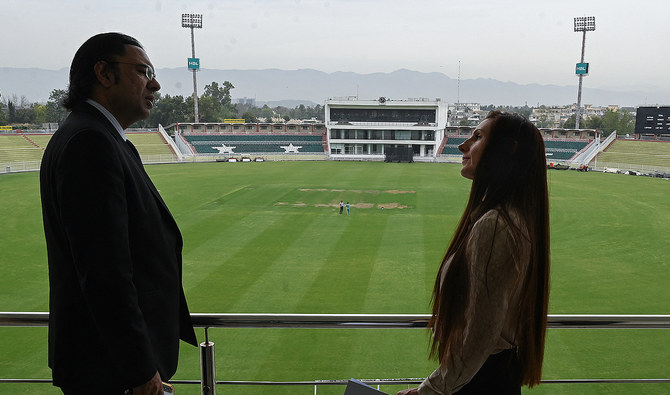
- PCB chairman says upgradation work has been delayed, asks authorities to hire international consultant
- It will be the first major international cricket tournament hosted solely by Pakistan since the 1996 World Cup
ISLAMABAD: The Pakistan Cricket Board (PCB) held a meeting at its headquarters in Lahore to review the upgradation plan for major cricket venues in the country on Saturday ahead of the two-week ICC Champions Trophy next year.
The meeting was presided over by the PCB chairman, Mohsin Naqvi, who directed the relevant officials to immediately hire international consultant to upgrade the Qaddafi Stadium Lahore, National Bank Stadium Karachi and Rawalpindi Stadium.
“The stadium upgradation work has already been delayed,” he observed during the meeting according an official PCB statement, instructing the authorities to speed up the process.
He also instructed to form a three-member committee to ensure the hiring process was carried out in keeping with the rules and regulations.
The PCB plans to provide world-class facilities at the three Pakistani cricket stadiums.
Its upgradation plan includes structural changes to the boxes along with improved facilities and numbered seats for spectators.
Additionally, the number of seats in the enclosures on both sides of the main gate of the Qaddafi Stadium will also be increased.
The PCB chairman directed the replacement of screens for scoreboards and live streaming, instructing the officials to prepare the feasibility to install new floodlights in the stadiums.
The ICC Champions Trophy is scheduled to take place in Pakistan from February to March 2025.
It is expected to be a significant event since it will mark the first major international cricket tournament hosted solely by Pakistan since the 1996 Cricket World Cup.
The tournament will include top-ranked One Day International (ODI) teams, with Pakistan having automatically qualified as the host nation.
‘No illegal Afghan nationals,’ seminary board declares as Pakistan’s Sindh plans crackdown
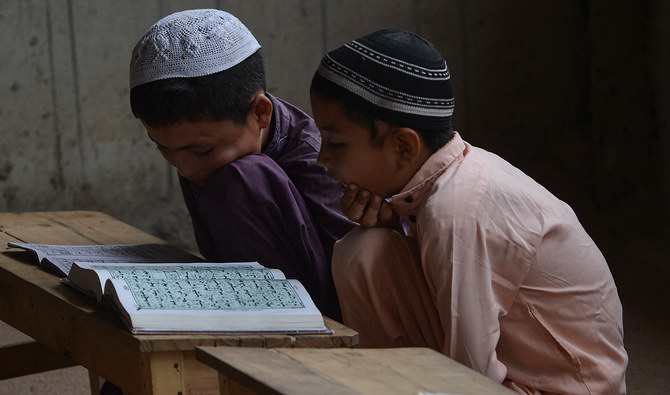
- The province took the decision after a security meeting was told a madrasah teacher was involved in 2023 KPO attack
- Independent analysts say Afghans involve in militant violence arrive from their country and are not residents of Pakistan
KARACHI: Pakistani seminaries have stopped giving admission to Afghan nationals except for those who approach them with the interior ministry’s approval, a top seminary board official informed Saturday, after the country’s southern Sindh province announced to deport illegally enrolled foreigners in seminaries and other educational institutions.
The decision was taken after the province’s apex committee, the top security forum, was briefed earlier this week that one of the individuals involved in the 2023 Karachi Police Office (KPO) attack was a madrasah or seminary teacher. It was also pointed out during the meeting that a number of unregistered foreigners were studying in such institutions in different parts of Sindh.
The 2023 attack was launched by militants, armed with guns and grenades, who stormed the building, leading to a prolonged gunfight with security forces. This confrontation resulted in casualties among both police officers and civilians, along with substantial damage to the police facility. The KPO attack was claimed by the banned militant network Tehreek-e-Taliban Pakistan (TTP), whose leadership is reportedly based in neighboring Afghanistan.
Speaking to Arab News, Maulana Talha Rehmani, spokesperson of Wafaq ul Madaris Al-Arabia Pakistan, said local seminaries had stopping enrolling Afghan nationals almost a year ago.
“Our madrasah used to offer admission to Afghan refugees who possessed proof of registration cards,” he said. “But that also stopped a year ago.”
“Different Pakistani intelligence agencies frequent seminaries for information,” he continued. “Nothing is hidden. The madrasas have a proper system of registration. We are ready to cooperate.”
Rehmani said the authorities had not shared any details with them about the identity of the seminary teacher involved in the KPO attack.
However, Dr. Aamir Tuaseen, former chairman of Pakistan Madrasah Education Board, noted seminaries lacked any coherent policy to develop “a monitoring system” for students.
“Admissions are granted to students without proper background checks,” he told Arab News. “The admission authorities also overlook which province or country does a student belong to, especially in case of Afghanistan.”
He added that boards of religious seminaries should take it upon themselves to grant admission only to students from the city where the seminary is located.
“This will help gather information about the background of every student,” he said, noting the current directorate of religious education did not seem to be fully functional.
The provincial information minister, Sharjeel Inaam Memon, did not respond to a request for comment, but a police official told Arab News on condition of anonymity the madrasah teacher involved in the KPO attack was a Pakistani national.
“The madrasah teacher was identified as Aryadullah who worked with a Karachi-based seminary,” the official said. “He was Pakistani citizen.”
Ihsanullah Tipu Mehsud, a security expert who manages an online publication, The Khorasan Diary, said the Afghan nationals involved in militant violence in Pakistan mostly arrived from the neighboring state and were not residents of Pakistan.
“The involvement of Afghan nationals in acts of terrorism cannot be ignored, but in my opinion, the government’s assertion is overstated,” he said. “The individuals involved in recent acts of terrorism are primarily those who have arrived directly from Afghanistan to carry out attacks rather than Afghan refugees.”
He emphasized any measures related to the expulsion of Afghan students from seminaries should not be driven by a reactionary approach.
“It is critical to implement gradual [seminary] reforms in accordance with the national action plan,” Mehsud said.
Saudi business delegation to arrive in Pakistan Sunday to explore investment opportunities — minister
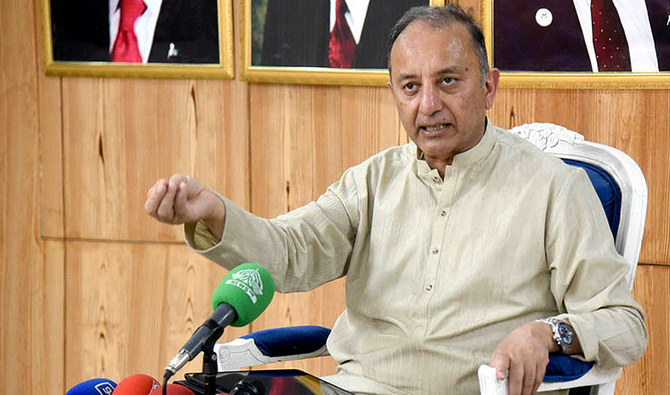
- Musadik Malik says Saudi investment will mainly benefit small technology firms run by young Pakistani students
- He informs the two sides have also discussed a new refinery for export purposes that will help with foreign revenue
ISLAMABAD: A high-level Saudi business delegation is scheduled to arrive in Pakistan tomorrow to explore investment opportunities in various economic sectors by holding meetings with private sector organizations, said Federal Minister for Petroleum Musadik Malik during a media briefing held in Lahore on Saturday.
The two countries have witnessed a flurry of official visits in recent weeks, with Saudi Foreign Minister Prince Faisal bin Farhan traveling to Islamabad earlier in April, before Prime Minister Shehbaz Sharif’s two-day visit to the kingdom to attend a World Economic Forum meeting and hold a number of meetings.
“The Saudi Deputy Investment Minister is visiting Pakistan tomorrow,” said Malik, who is also the focal person for Saudi-Pak bilateral collaboration. “He is bringing representatives from 30 to 35 companies whose CEOs are coming here.”
The Pakistani minister maintained his country had always cherished cordial ties with the kingdom, though it had not managed to turn this “relationship of friendship into a relationship of stability and progress.”
He said Pakistan mostly discussed its financial concerns with the Saudi authorities and requested their support. However, the present government wanted to change that by focusing its bilateral conversations on mutually beneficial progress and development, not aid and assistance.
The minister said the two sides discussed a new refinery project during the recent engagements that would be used for export purposes to earn foreign revenue. Additionally, food security was also discussed to further strengthen Pakistan’s agricultural sector.
He informed that Prime Minister Sharif wanted the country’s “private sector to take the lead on this path to progress.”
“That is why Saudi investors have been invited to come here,” he continued. “They will sit with Pakistani companies and figure out ways to connect the Pakistani talent with the capital and investment needed at the international level for the IT revolution.”
Malik said the bilateral collaboration would primarily benefit small businesses, particularly the technology companies established by young students who were likely to get significant amount of investment from Saudi entrepreneurs.
He expressed optimism that chemical, energy and agricultural companies would also gain advantage from the ongoing bilateral collaboration between the two sides.
Pakistan committee discusses development of border areas in inaugural session
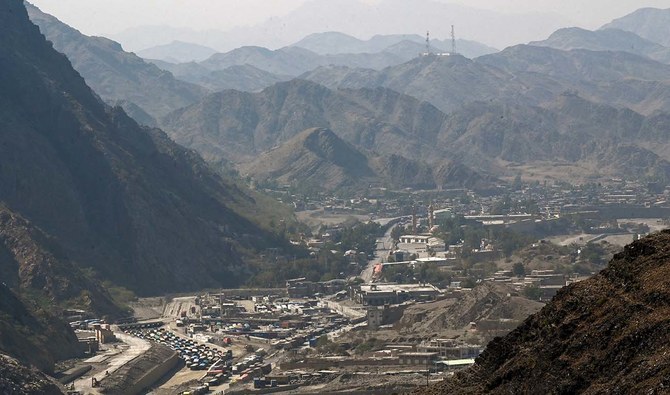
- The committee was formed to devise comprehensive strategies for holistic development in Pakistan’s border regions
- Key topics that came under discussion at the inaugural session included tariff rationalization, employment creation
ISLAMABAD: A high-level committee tasked with development of Pakistan’s border regions on Saturday held its inaugural session in Islamabad to discuss the challenges facing communities based in the country’s frontier regions, the Pakistani commerce ministry said.
The inaugural session of the committee, which was formed to devise comprehensive strategies for holistic development in these areas, was presided over by Commerce Minister Jam Kamal Khan, according to the ministry.
Key topics that came under discussion at the meeting included tariff rationalization and employment creation, reflecting the committee’s commitment to addressing border communities’ challenges.
“The committee aims to present its recommendations to the Prime Minister within 10 days, signaling a promising start to collaborative efforts for socio-economic development in the region,” the commerce ministry said in a statement.
Pakistan shares a long, porous border with Iran and Afghanistan, with people live along it relying on cross-border trade with little or no government tariffs, quotas, subsidies or prohibitions.
Islamabad last year announced restrictions on the informal trade to discourage smuggling of goods and currency in order to support the country’s dwindling economy.
Pakistan’s trade with China mostly takes place through formal channels, while the country’s trade ties with India, another neighbor it shares border with, remain suspended since 2019 over the disputed region of Kashmir.
Pakistan records ‘wettest April’ in more than 60 years — weather agency
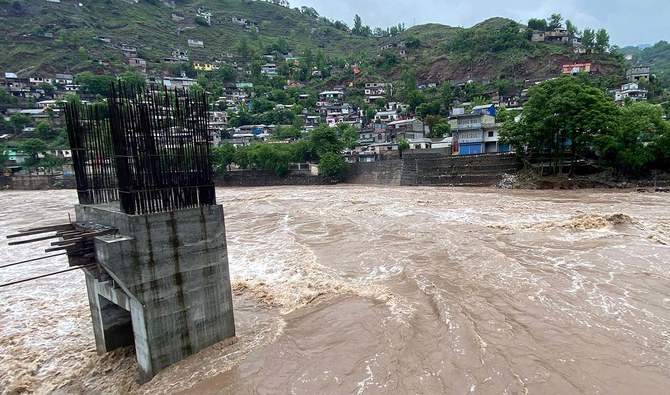
- Pakistan’s metrology department says April rainfall was recorded at 59.3 millimeters, ‘excessively above’ the normal average of 22.5 millimeters
- There were at least 144 deaths in thunderstorms and house collapses due to heavy rains in what the report said was the ‘wettest April since 1961’
ISLAMABAD: Pakistan experienced its “wettest April since 1961,” receiving more than twice as much rain as usual for the month, the country’s weather agency said in a report.
April rainfall was recorded at 59.3 millimeters, “excessively above” the normal average of 22.5 millimeters, Pakistan’s metrology department said late Friday in its monthly climate report.
There were at least 144 deaths in thunderstorms and house collapses due to heavy rains in what the report said was the “wettest April since 1961.”
Pakistan is increasingly vulnerable to unpredictable weather, as well as often destructive monsoon rains that usually arrive in July.
In the summer of 2022, a third of Pakistan was submerged by unprecedented monsoon rains that displaced millions of people and cost the country $30 billion in damage and economic losses, according to a World Bank estimate.
“Climate change is a major factor that is influencing the erratic weather patterns in our region,” Zaheer Ahmad Babar, spokesperson for the Pakistan Meteorological Department, said while commenting on the report.
While much of Asia is sweltering dure to heat waves, Pakistan’s national monthly temperature for April was 23.67 degrees Celsius (74 degrees Fahrenheit) 0.87 degrees lower than the average of 24.54, the report noted.



